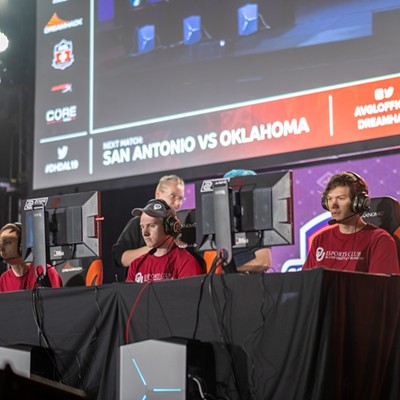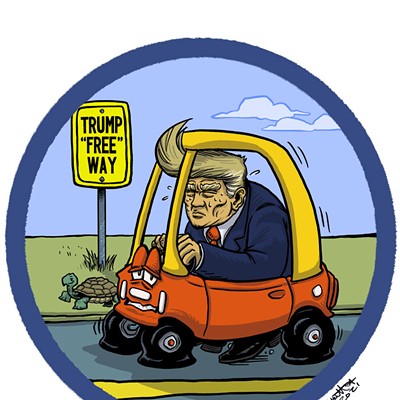Oklahoma Gazette provides an open forum for the discussion of all points of view in its Letters to the Editor section. The Gazette reserves the right to edit letters for length and clarity. Letters can be mailed, faxed, emailed to pbacharach@ okgazette.com or sent online at okgazette.com, but include a city of residence and contact number for verification.
Judicious info for voters
Keith Rollin Eakins’ commentary (“Whither a Kardashians court?,” Nov. 14, Oklahoma Gazette) reduces the importance of an accountable judiciary to something approaching selecting the next American Idol. It is simplistic to throw pop culture platitudes at political discourse rather than discuss Oklahoma judicial history and the need for an informed electorate.
We should remember that our current system of judicial retention was adopted by Oklahomans in response to attorney bribery scandals involving the state Supreme Court. Oklahomans overwhelmingly voted to restore the integrity of the court through accountability by judicial retention elections.
Since then, no justice or judge up for retention has been defeated, despite countless voters going to the polls and blindly voting “yes” without any information to better guide their decision.
For decades, lawyers have completely dominated the judicial selection and election process. This year, the State Chamber-sponsored Oklahoma Civil Justice Council (OCJC) published a review of cases decided by the Supreme Court and Civil Court of Appeals and asked a simple question: “Does this case expand civil liability for Oklahoma’s citizens, and if so, did the judges’ ruling on the exact same case differ in their interpretation of the law?” This is similarly done in many other states.
OCJC gathered the information and posted it on our website for voters. This was an informational campaign that did not urge Oklahomans to vote one way or the other.
Threatened by these efforts, trial lawyers raised more than $400,000 in a
mere three weeks to fund an aggressive campaign to “Vote Yes for Fair
and Impartial Judges.”
We
agree we want fair and impartial judges, but attorneys, who have had
cases before these same judges and justices, raising money to keep these
judges on the bench — is that the type of accountability Oklahomans
voted for in 1967?
A democracy only functions properly when the electorate is well informed.
In
fact, the Oklahoma Bar Association, in response to OCJC, for the first
time started its own judicial website to provide more information to the
public. It is time for every voter, not just trial lawyers, to have
knowledge of the actions of our highest courts.
It
is important to note that it is the lawyers crying foul, not judges or
justices. Supreme Court Justice James Edmondson commented on the OCJC
rankings: “It’s a good idea to get information out there for the
citizenry, especially for the people who plan on voting. It’s a
well-presented and wellbalanced exposition of the matters that seem to
be of concern to them and probably many others.”
It benefits no one but trial lawyers who have historically dominated judicial selection and elections to keep the voting public in the dark.
—Fred Morgan Oklahoma City
Morgan is president and CEO of the State Chamber of Oklahoma.
Go ahead, secede
The
decisive victory of the Obama- Biden ticket is prompting petitions in
many Southern states urging secession from the United States. The idea
merits consideration.
Becoming
two separate nations would reduce political tensions and permit
Southern states to govern themselves as they prefer. It would also
reduce the U.S. budget, as half the spending in some of those states is
federal money, and most are home to U.S. military bases.
—Nathaniel Batchelder Oklahoma City
Saving oil
Not to discount Mickey McVay’s environmental education, but his “Kool-Aid’s global warming flavor” letter (Oct. 24, Gazette) has
left a bad taste in my mouth. Reason being, he has previously
identified himself in letters to the editor as having been an “oily,” as
in one who works in the oil industry.
This
tells me that McVay, while he may have a background in environmental
studies, also has a predisposition to defend an industry that is his
livelihood. This makes his perspective about as reliable as an asbestos
salesman telling me that all those cancer studies are taken out of
context.
Of course, to
his credit, the man he’s taking shots at, Robin Meyers, is likely no
more versed in environmental impact than your average minister. Meyers’
language may have been harsh, but it was not biased by the need for
personal gain; that tends to tip this reader’s favor in his direction.
McVay’s
own agenda is easily qualified by his comment that “people like Robin
can cause severe economic harm and hardship for their fellow human
beings if their rants are followed before they are exposed for following
false prophets.”
That statement implies that in one swift move mankind will cease the operation of a 100-plus-years-old infra structure and immediately
begin using a new one simply because of a couple of hippies. Only the
ethos of the masses can dictate change, and it will not happen
overnight. He need not fear his industry collapsing.
I
can’t help but feel that McVay is being shortsighted when viewing the
relationship between climate change and the industry he holds dear. Even
if he’s right, the one thing he cannot attest to is the unlimited
nature of petroleum and its by-products. Because oil is in everything
from plastics to pesticides, it’s in our interest to make it last as
long as possible.
That
doesn’t mean that his industry dies; if anything, it means it lives
longer. A shift to vehicles that run on renewable energy might not
change what’s happening in our environment, but it will ensure we have
oil to produce the things we need in the future, everything from
artificial limbs to Ziploc bags.
McVay
goes on to say, “Haste makes waste, and foolish decisions need to be
avoided before all of the facts are evaluated with regard to man-made
global warming or other environmental concerns.”
I
actually agree with this statement. But the foolish decision is the one
where we waste a vital, extremely versatile and necessary product by
dumping it into the tanks of our cars.
Even
if we could conclusively prove that there is no environmental impact
from burning fossil fuels, we cannot ignore the precious and limited
nature of this commodity. We must do everything in our power to make it
last as long as possible.
The
Kool-Aid analogy isn’t a fair one. This isn’t Jonestown. Meyers and
people like me only want the preservation of life. There’s no cyanide in
our Kool-Aid — just a desire to help the future of humanity.
I
don’t believe that fully exploiting a limited resource does anything
other than leave us ill prepared for when that resource becomes scarce.
Sometimes great discussions happen over a drink. Why can’t that drink be Kool-Aid?
—Brandon Wertz Norman











